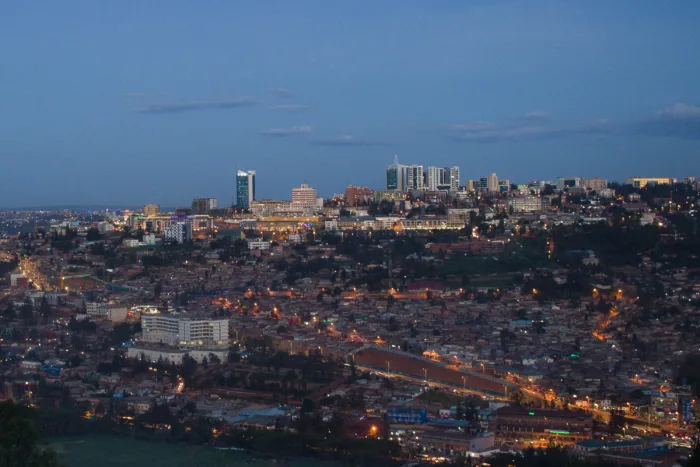Kigali: The Hub of Development in Central Africa. In the heart of Central Africa, Kigali (Rwanda) has emerged as a hotspot of economic growth, innovation, and social transformation. The capital of Rwanda has not only overcome a tumultuous past but has also reinvented itself as a model of sustainable development and good governance on the African continent. This article explores how Kigali has become a key driver of progress in the region, backed by impressive economic data.
Urban Planning, Sustainability, and Infrastructure

Urban Planning and Sustainability: Kigali is renowned for its cleanliness and order, characteristics rarely associated with major African cities. The city has implemented strict environmental policies, including a ban on plastic bags and community-involved recycling programs. Urban planning in Kigali exemplifies sustainable development, focusing on green spaces, efficient mobility, and waste management.
Infrastructure and Connectivity: Modern infrastructure is another pillar of Kigali’s development. Kigali International Airport connects the city to the rest of the world, facilitating trade and tourism. Well-maintained roads and public transport projects like the Kigali Bus Rapid Transit have significantly improved mobility within the city and its surroundings. These advancements not only enhance the quality of life for residents but also make Kigali an attractive destination for investors and visitors.
Economic Growth and Key Sectors
Economic Boom and Technological Innovation: Under the leadership of President Paul Kagame, Rwanda has prioritized technological innovation. Kigali is at the epicenter of this movement, with Kigali Innovation City standing as a testament to the country’s commitment to technology and entrepreneurship. This tech park hosts startups, educational institutions, and multinational companies, creating a vibrant ecosystem that fosters innovation and business development.
Key Economic Data:
- Rwanda’s GDP: In 2023, Rwanda’s GDP was estimated at approximately $12.37 billion, with Kigali contributing significantly due to its role as a commercial and administrative center.
- Economic Growth: Rwanda has experienced sustained economic growth, with GDP growth rates averaging around 7-8% annually over the past decade.
- Foreign Direct Investment (FDI): Kigali attracts substantial FDI, exceeding $400 million in 2022, driven by sectors such as technology, tourism, and manufacturing.
- Exports: Rwanda’s exports reached approximately $1.5 billion in 2023, with products like coffee, tea, and minerals being major contributors, many of which are processed and exported from Kigali.
Important Economic Sectors:
- Finance and Banking: Kigali is becoming a financial hub in the region, with numerous banks and financial institutions setting up operations in the city. The Rwanda Stock Exchange, headquartered in Kigali, plays a crucial role in the financial sector, attracting investments and facilitating economic growth.
- Construction and Real Estate: The construction and real estate sectors in Kigali are booming, driven by rapid urbanization and infrastructure development. The cityscape is evolving with new residential, commercial, and mixed-use developments that cater to the growing population and business community.
- Tourism: Tourism is a significant contributor to Kigali’s economy. The city’s strategic location makes it a gateway to Rwanda’s famous national parks, such as Volcanoes National Park, home to the endangered mountain gorillas, and Akagera National Park, known for its diverse wildlife and savannah landscapes. Kigali itself attracts tourists with its clean streets, vibrant markets, and cultural landmarks.
- Healthcare and Education: Kigali has invested heavily in healthcare and education, making it a center of excellence in these sectors. The city boasts modern hospitals, healthcare facilities, and educational institutions that serve both local and international communities. The Kigali Health Institute and the University of Rwanda are key players in advancing education and healthcare services.
Education and Training
Investment in education has been fundamental to Kigali’s growth. The city is home to renowned academic institutions like the University of Rwanda and several international schools. Additionally, Kigali hosts numerous training and professional development centers that prepare the workforce to tackle 21st-century challenges. This emphasis on education has resulted in a young, educated population ready to lead the country’s future.
Political Stability and Good Governance
Political stability and good governance are essential for any economic success story. Kigali has been at the forefront of Rwanda’s efforts to eradicate corruption and promote transparency and efficiency in public administration. The city hosts numerous government offices and international organizations that oversee and support these efforts, solidifying its role as a beacon of stability in the region.
Tourism and Culture
Kigali’s growth is not limited to the economy and technology; it has also become a vibrant cultural hub. The city offers a blend of history and modernity, with attractions like the Kigali Genocide Memorial, which commemorates the country’s tragic past, and the Kigali Convention Centre, an architectural icon hosting international events. Moreover, Kigali is known for its burgeoning arts and music scene, attracting tourists from around the world.
Kigali has become an inspiring example of how a city can transform itself and lead development in a region. With its focus on sustainability, innovation, education, and good governance, Kigali is well-positioned to continue its path of progress and serve as a model for other cities in Africa and beyond. Rwanda’s capital is undoubtedly a beacon of hope and development in Central Africa, and its future promises even more successes and transformations.